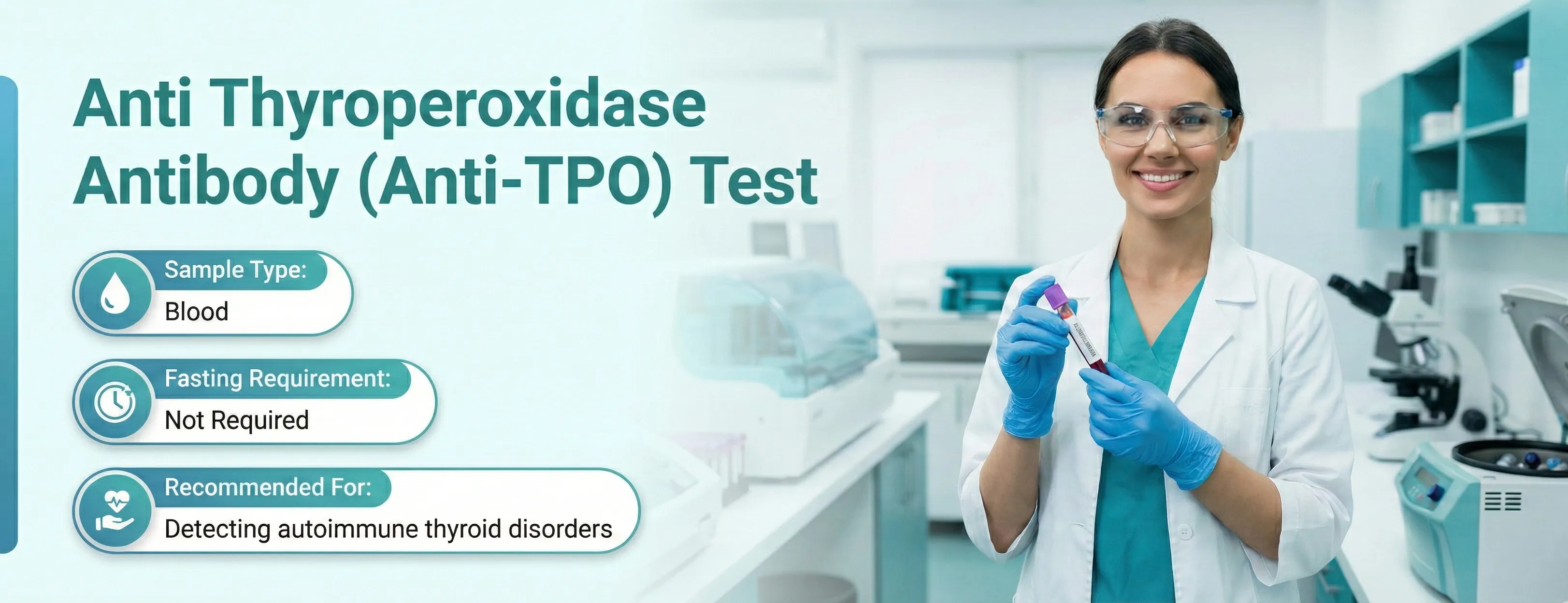444+ orders placed in your location
100% NABL & ISO Certified Lab • 100% Accurate Reports
Anti Thyroperoxidase Antibody (Anti-TPO) Test
Anti Thyroid Peroxidase Test, TPO, Hashimoto Disease test, ATPO
- SummaryThe Anti-TPO test detects antibodies against thyroid peroxidase, an enzyme crucial for thyroid hormone production. Elevated levels may indicate autoimmune thyroid disorders like Hashimoto’s thyroiditis or Graves’ disease. The test is done using a blood sample, and fasting is not required.Read more
- Reports Within16 HrsView Sample Report100% NABL & ISO Certified Labs
- SampleBlood
- AgeAll Age Group
- GenderMale and Female
- FastingNot Required
PharmEasy Promises
Know More About The Test
A quick info on Anti Thyroperoxidase Antibody (Anti-TPO)
Overview
There is a small gland in our body located in front of the neck. This gland is the thyroid gland. It is a vital part of our body and controls various factors of our body such as influencing metabolism, growth and development and body temperature. During infancy and childhood, adequate thyroid hormone is crucial for brain development.
Our immune system creates antibodies to fight harmful foreign organisms such as bacteria and viruses. But in some cases, the antibodies mistake the healthy cells for foreign substances and start attacking them. This leads to autoimmune diseases.
Thyroid antibodies are the reason anti-TPO tests are done. Thyroid antibodies can be formed inside a human’s body when the immune system malfunctions and starts targeting the thyroid gland and its proteins. Various types of thyroid antibodies affect the thyroid gland in different ways. Anti-TPO stops TPO from using iodine which leads to hypothyroidism. This also leads to inflammation that can damage the thyroid gland partly or fully.
Thyroid peroxidase is an enzyme produced in the thyroid gland. TPO plays an important role in the production of thyroid hormones. The anti-TPO test is done to diagnose the level of antibodies against TPO. These antibodies are responsible for causing Hashimoto disease and Graves’ disease.
An anti-TPO test is used to detect the antibody levels in the blood of the patient. This test is ordered by the physician when the patient exhibits symptoms of hypothyroidism or hyperthyroidism. The results of the anti-TPO test help in pointing out which hormone antibodies of the thyroid gland are affecting the body.
Thyroid disorders are common in India due to the lack of proper nutrition for a majority of the population. The lack of iodine can cause the thyroid gland to not work as it should. This can lead to deficiency diseases such as goitre and hypothyroidism.
Risk Assessment
Subclinical hypothyroidism, Goitre, Hyperthyroidism, Thyroid Cancer, Hashimoto disease, Graves’ disease
What does this test detect?
The anti-TPO test measures the concentration of anti-TPO in the bloodstream.
Indications for Anti-TPO Test
This test is prescribed for people with the following symptoms:
- Fatigue and sluggishness
- Increased sensitivity to cold
- Constipation
- Pale, dry skin
- A puffy face
- Brittle nails
- Hair loss
- Enlargement of the tongue
- Depression
- Memory lapses
- Unexplained weight gain
- Muscle aches, tenderness and stiffness
- Joint pain and stiffness
- Muscle weakness
Because of the above-mentioned symptoms, the doctor might prescribe an anti-TPO test. The following diseases are majorly related to anti-TPO:
- Goitre
- Subclinical hypothyroidism
- Graves’ disease
- Hashimoto disease
- Thyroid cancer
Following the specific tests regarding the different antibodies, the physician or endocrinologist can pinpoint the cause of the problem and administer appropriate treatment. Pregnant women are also advised to take this test to safeguard their health as well as the unborn baby.
How frequently should you take this test?
There is no fixed time interval during which the anti-TPO test is done. In the presence of symptoms of autoimmune diseases such as Hashimoto disease and Graves’ disease, the physician might prescribe an anti-TPO test along with other tests to get an accurate idea of the cause of the issue. The test can help diagnose whether the root of the problem is related to thyroid peroxidase or other hormones of the thyroid gland.
Test Preparation
Before the Test
No special precautions are required to be taken before the test. If the patient has a medical history or is undergoing medical treatment for any other disease, it is advisable to inform the physician about it.
During the Test
The test is a simple blood test. A medical professional will tie a strap tightly around the arm and extract the required amount of blood from the vein. The procedure has little to no risk and takes less than 5 minutes.
After the Test
After the sample is taken, the point from where the blood was extracted is covered with a swab of cotton to prevent bleeding. There are no post-test restrictions. Normal activities can be resumed
Parameters
The anti–TPO test diagnoses the levels of antibodies against the thyroid peroxidase enzyme. The values indicate the presence of anti-TPO and the concentration in the blood. The test can be complex to interpret, so the best option is to consult with the specialist. In the presence of Hashimoto’s thyroiditis, the result of the anti–TPO test will be on the higher side. The same goes for patients with Graves’ disease.
Ranges
|
Range |
IU/ml |
|---|---|
|
Normal |
Less than 9 IU/ml |
|
High |
More than 9 IU/ml |
The normal values and reference ranges of the test may vary from lab to lab. Please refer to the ranges mentioned in the report and consult a doctor to understand the interpretation of lab reports.
Test Result Interpretation
The anti-TPO test results show the concentration of antibodies in the bloodstream. If the value is within the normal range, i.e., less than 9 IU/ml, the chances of having an autoimmune disease related to TPO are less. But values above 9 IU/ml are an indication of autoimmune thyroiditis. Anti-TPO levels can also be on the higher side due to other autoimmune diseases.
The results of the anti-TPO test can also be divided and explained into positive and negative:
- Negative - Negative means the absence of antibodies against thyroid peroxidase. This means if the patient has symptoms of autoimmune diseases, it is probably not related to TPO.
- Positive - Positive means high levels of anti-TPO found in the blood. This means the patient may have Hashimoto’s disease or Graves’ disease.
The higher the concentration of anti-TPO, the more likely it is that the patient has an autoimmune disease of the thyroid gland. Thyroid diseases tend to get worse during pregnancy and they can harm the mother as well as the foetus. If the mother has ever had thyroid disease, she will be tested for anti-TPO, along with other thyroid antibodies.
Price/Cost
Depending on the city and the lab, the cost of an Anti-TPO test can differ. Generally, the price for an Anti-TPO test ranges from INR 825 to INR 1539. Here's a breakdown of the average expenses for an Anti-TPO test in several key cities in India:
City | Min Price | Average Price | Max Price |
Anti-TPO Test Price in Bengaluru | 825 | 1182 | 1539 |
Anti-TPO Test Price in Chennai | 825 | 1182 | 1539 |
Anti-TPO Test Price in Delhi | 825 | 1182 | 1539 |
Anti-TPO Test Price in Hyderabad | 825 | 1182 | 1539 |
Anti-TPO Test Price in Kolkata | 825 | 1182 | 1539 |
Anti-TPO Test Price in Lucknow | 825 | 1182 | 1539 |
Anti-TPO Test Price in Mumbai | 825 | 1182 | 1539 |
Anti-TPO Test Price in Nagpur | 825 | 1182 | 1539 |
Anti-TPO Test Price in Patna | 825 | 1182 | 1539 |
Anti-TPO Test Price in Pune | 825 | 1182 | 1539 |
Risks and Limitations
The anti-TPO test is a commonly done blood test with rare risks of complications. See your doctor if you notice:
- Persistent bleeding at the site of needle-insertion.
- The skin where the needle went in becomes red, swollen, or hurts.
Limitations of the test
- The accuracy of the test could be affected due to equipment or human mistakes.
- Misinterpretation of the markers leading to inaccurate report.
Was This Test Information Helpful?
Please rate your experience
References
People Also Ask
What is a normal TPO level?
Why are my TPO antibodies so high?
How much does an Anti-TPO test cost?
Have any doubts? Ask us.
Ask us anything about the Anti Thyroperoxidase Antibody (Anti-TPO) Test to understand it better
We provide trusted, expert-curated health content to support better awareness,prevention, and care.
Backed by experienced doctors, medical experts, and strict editorial standards.


